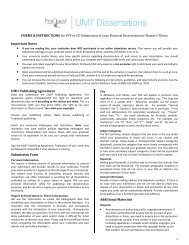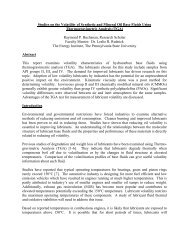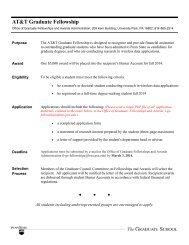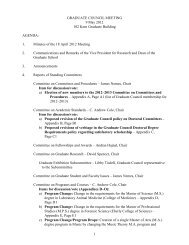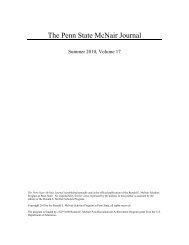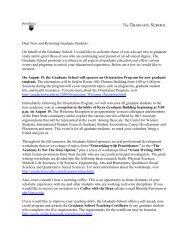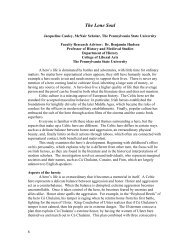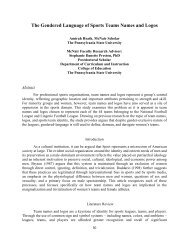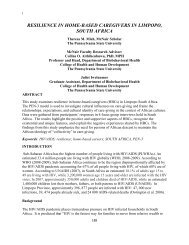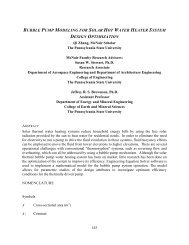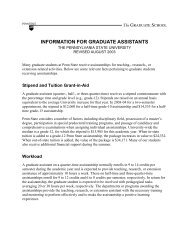1 GRADUATE COUNCIL MEETING 18 January 2012 102 Kern ...
1 GRADUATE COUNCIL MEETING 18 January 2012 102 Kern ...
1 GRADUATE COUNCIL MEETING 18 January 2012 102 Kern ...
Create successful ePaper yourself
Turn your PDF publications into a flip-book with our unique Google optimized e-Paper software.
work, the Ph.D. student must take a two-day written comprehensive examination that is developed by the student's Ph.D.<br />
committee. Following the comprehensive exam, continuous registration is required for all Ph.D. graduate students until the<br />
dissertation is approved. Each student presents a comprehensive thesis proposal to his/her committee prior to starting his/her<br />
dissertation research and must present the results of this research in a final oral examination.<br />
The M.Eng. degree is a nonthesis professional master's degree. Candidates for the M.Eng. degree are required to complete<br />
30 credits of course work. A minimum of <strong>18</strong> credits must be at the 500 level or above. Students must follow the approved<br />
program of courses for one of the four available specialty areas. Minor modifications to these programs are permitted, with<br />
approval of the Graduate Program Officer. Each student must also complete a capstone project/report, supervised by a member<br />
of the graduate faculty.<br />
For the integrated B.A.E./M.A.E. degree program, 30 credits of the 172 total credits required to receive both degrees are applied<br />
toward the master's degree (a portion of these credits count toward both degrees). A minimum of <strong>18</strong> credits of graduate-level<br />
course work is required (500 and 800 level). Approved M.A.E. course sequences are available for each of the four undergraduate<br />
option areas. Each student must submit an M.A.E. course plan for approval when applying to this program and must request<br />
approval from the Graduate Program Officer of any proposed modifications to this plan following admission to the program.<br />
Students admitted to an integrated program (B.A.E./M.A.E. or B.A.E./ M.S.) must maintain a GPA in all classes used toward the<br />
M.A.E. or M.S. degree of at least 3.0. For both the integrated B.A.E./M.A.E. and B.A.E./M.S. degree programs, 30 credits of the<br />
172 total credits required to receive both degrees are applied toward the master's degree (up to 12 credits count toward both<br />
degrees). A minimum of <strong>18</strong> credits is required at the graduate level (500, 600 and 800 level). For the B.A.E./M.A.E. degree<br />
program, all of graduate credits are course credits. For the B.A.E./M.S. degree program, a thesis is required and six credits of<br />
thesis research (600 or 610) must be included in the candidate’s academic course plan. Approved integrated program course<br />
sequences are available for each of the four undergraduate option areas. These sequences specifically identify the 12 credits of<br />
courses that count toward both degrees. Each student must submit a course plan detailing the graduate component for approval<br />
when applying to this program and must request approval from the Graduate Program Officer for any proposed modifications to<br />
this plan following admission to the program.<br />
All students in the M.Eng., M.S., and Ph.D. programs must also attend a minimum of 10 approved lectures during their degree<br />
program.<br />
Student Aid<br />
Graduate assistantships and other forms of student aid are described in the STUDENT AID section of the Graduate Bulletin. A<br />
limited number of research and teaching assistantships, scholarships, and fellowships are available to M.S. and Ph.D. students in<br />
the Department of Architectural Engineering. The intent of these assistantships and awards is to support students conducting<br />
research under faculty supervision. For this reason, students in the M.S. and Ph.D. programs who receive these types of financial<br />
support are expected to complete their degree program, including the thesis or dissertation, and may not transfer to the Master of<br />
Engineering degree program.<br />
Courses<br />
Page E20<br />
Graduate courses carry numbers from 500 to 599 and 800 to 899. Advanced undergraduate courses numbered between 400 and<br />
499 may be used to meet some graduate degree requirements when taken by graduate students. Courses below the 400 level may<br />
not. A graduate student may register for or audit these courses in order to make up deficiencies or to fill in gaps in previous<br />
education but not to meet requirements for an advanced degree.<br />
ARCHITECTURAL ENGINEERING (A E) course list<br />
Last updated by Publications: 5/23/11<br />
Undergraduate Degree Programs Bulletin<br />
Architectural Engineering<br />
University Park, College of Engineering (A E)



